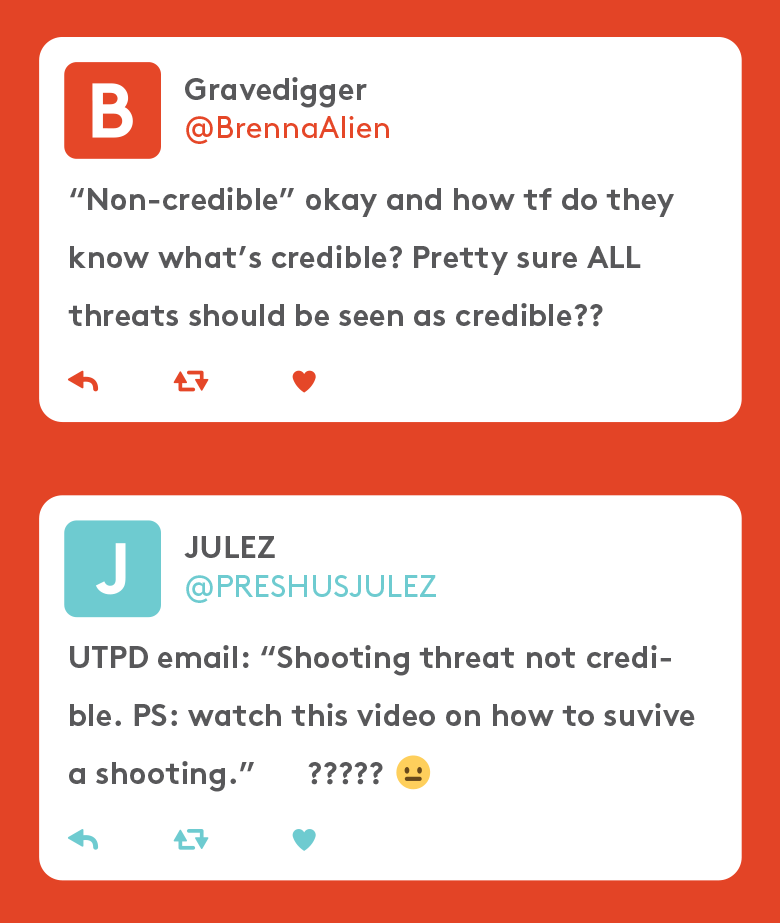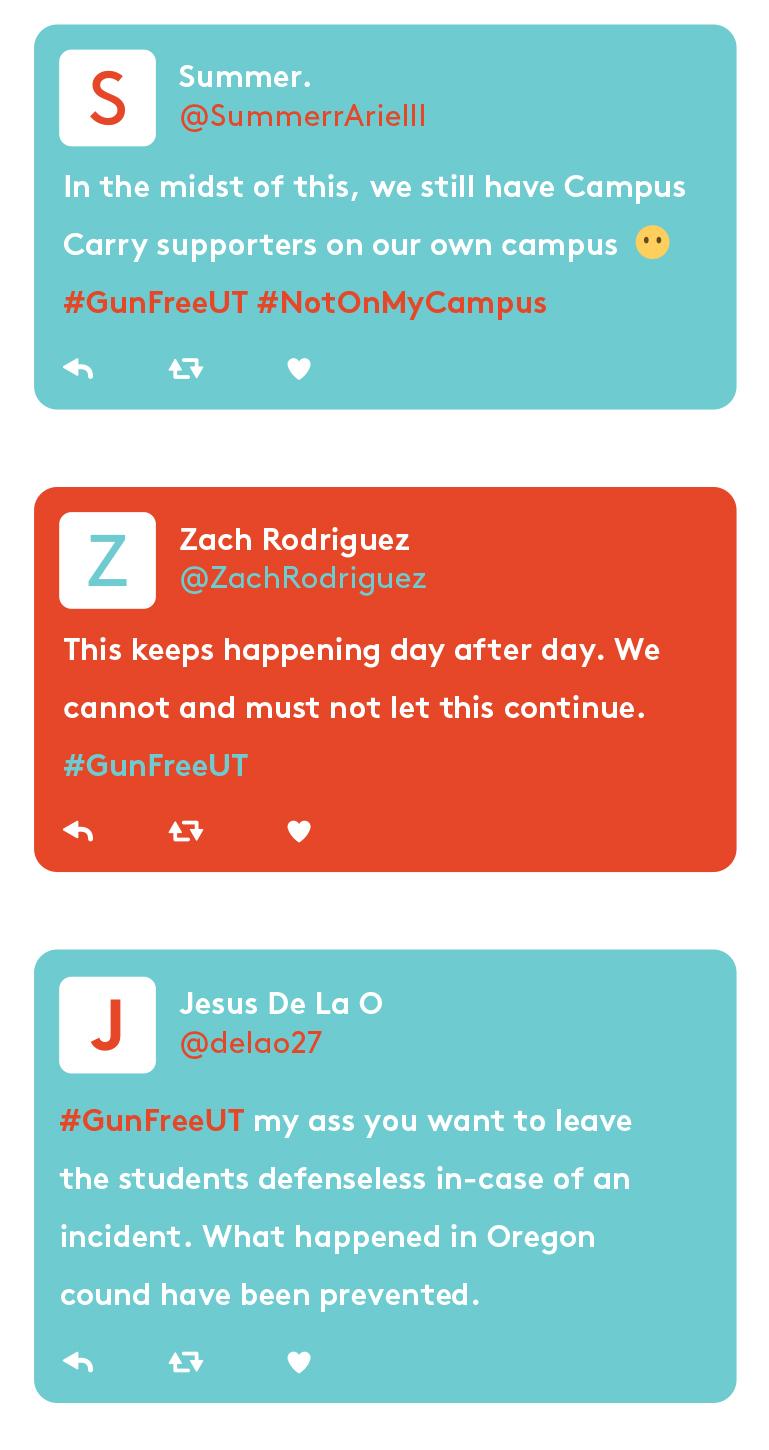Editor’s Note: This story appeared in the December 2015 ORANGE Issue IV.
Starting on August 1, 2016, exactly 50 years after the infamous UT Tower shooting, students will be able to bring concealed handguns inside classrooms and dormitories on campus. Senate Bill 11, also known as the “campus carry” law, allows concealed-handgun license holders to carry weapons in public university buildings in Texas. Despite staunch opposition from many state university leaders and students, including UT Chancellor William McRaven, Gov. Greg Abbott signed the bill into law in June. While some private institutions have already opted out of the law, public universities like UT are mulling their options.
Story by Lauren Beccue
Illustrations by Ryan Hicks
Although state law has allowed concealed handguns on the grounds of public university campuses since 1995, SB 11 extends it into all university buildings. The law does, however, include a caveat that lets college presidents designate certain “gun-free zones” on their campuses. In response, UT President Gregory Fenves established a 19-member working group, which delivered him their 25 recommendations regarding implementing SB 11 on Dec. 10.
The working group held two public forums, the first of which was on Sept. 30. Before opening the floor to public comment, Steven Goode, a UT law professor and chair of the working group, stressed that the university’s regulatory power regarding campus carry was limited. According to the law, the rules and regulations implemented by each university “may not prohibit” or “have the effect of generally prohibiting” concealed carry on campus. However, an overwhelming majority of speakers at the forum voiced their opposition to the presence of handguns in any buildings on campus.
“Allowing guns in the classroom violates our deeply held belief that classrooms should be treated as a sanctuary,” public affairs graduate student Jon Brandt said at the forum. “As students, we grew up expecting that regardless of our families’ social or economic backgrounds, we could come to the classroom and be in a safe, nurturing environment.”
Others spoke in favor of the legislation, urging the university to implement as few restrictions as possible. They argued that responsible, permit-holding gun owners were not a threat to others. “We are not vigilantes. We are not a danger to this campus. We are not the bad guys you read about in the news,” law student Justin Stone said.
The day after the forum, students, faculty and parents held a rally on the West Mall to protest campus carry. As the protests were coming to a close, news broke that a student had opened fire on the Umpqua Community College campus in Oregon, killing 9 people. Currently, Oregon is one of seven states that allow concealed carry on campus, according to the National Conference of State Legislatures. As social media was flooded with posts about the shooting and the issue of guns on campus, students at UT joined the discussion.
Social media may have also played a part in warning of the Oregon shooting. Federal officials investigated a suspicious exchange on a 4chan message board that occurred the night before the massacre, where an anonymous user posted, “Some of you guys are alright. Don’t go to school tomorrow if you are in the northwest.” On Oct. 5, UT police were notified of a nearly identical threat, also posted on 4chan that read, “Don’t go to school tomorrow if you’re near Austin.” UTPD announced they were investigating the threat, but stated at the time there was “no reason to believe this is a credible threat to our campus.” Students still took to Twitter to express their concern.
A few days later, UT alum Jessica Jin planned a “strap-in” protest against campus carry. Instead of carrying handguns to campus on the first day of the fall semester, students will bring dildos. “Just about as effective at protecting us from sociopathic shooters, but much safer for recreational play,” the Facebook event’s description reads. More than 10,000 people have signed up to participate.
Students aren’t the only ones who have expressed their opposition to the law. At present, more than 1,300 UT professors have signed a petition started by the advocacy group Gun Free UT refusing to allow guns in their classrooms. In November, the Faculty Council at the University of Texas at Austin passed a unanimous resolution urging the administration to ban guns in all “educational spaces,” including classrooms, dorms and offices, claiming it would create “an uneasy and potentially hostile environment for intellectual inquiry.” However, in his address to the council before the vote, President Fenves said that while he understands the faculty’s concerns, there are limits to his regulatory power.
Private institutions are not so limited. Private universities including Texas Christian University, Southern Methodist University and Trinity University have all chosen to opt out of campus carry. Baylor University President Ken Starr said he had “little doubt” that his college would follow suit. In November, Texas State University, a public institution that must comply with the law, released recommendations restricting guns from childcare facilities, healthcare buildings and even the University President’s house and surrounding grounds.
Within the framework of UT’s working group’s recommendations, four general topics were covered: how handguns must be carried and stored, where handguns must not be carried, measures to be taken in the case of violated restrictions and proactive measures to ensure campus safety. Gun Free UT responded saying they reject the recommendations, stating, “If gun carriers feel unsafe in storing their weapons, they should leave them at home.” Students for Concealed Carry Texas, the Texas chapter of the non-profit national organization, stated the recommendations “[conflict] with basic handgun training.”
Whether these recommendations will go into effect remains to be seen, given the heavy restrictions placed on university presidents and these working groups by the law.
















































